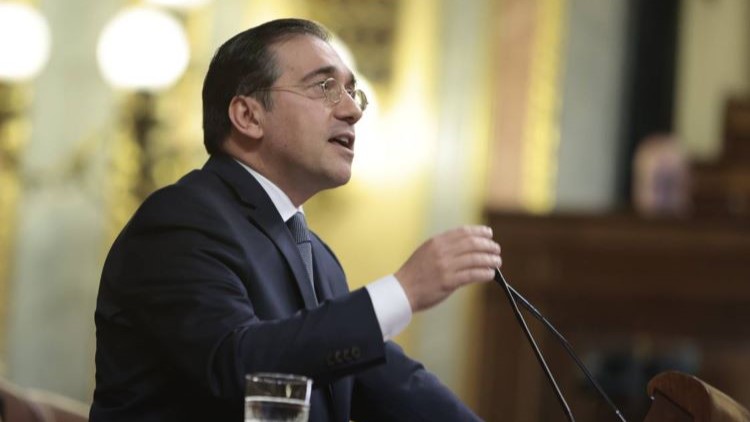Eduardo González
The Minister of Foreign Affairs, José Manuel Albares, will appear tomorrow, December 5, before the plenary session of the Congress to report on the Gaza war, at the request of the PP and in the midst of the strong diplomatic crisis that relations between Spain and Israel are going through due to several statements made by the President of the Government, Pedro Sánchez, which have not pleased the Executive of Benjamin Netanyahu at all.
Albares’ appearance will take place almost two months after the beginning of the Middle East conflict. Initially, the PP requested the Minister’s intervention to report on the conclusions of the European Council of 26 and 27 October, largely devoted to the situation in the Middle East and in which the 27 expressed their support for the international peace conference proposed by Spain to move towards a two-state solution. However, since last November 21, when the Congress Bureau approved the calendar and the appearance of Albares, the situation has become very complicated for the Government of Sanchez, which makes foresee a particularly tense session.
It all began during the tour that the head of the Executive made on November 22 and 23 in the Middle East, accompanied by the Prime Minister of Belgium, Alexander de Croo, representing the current rotating Presidency of the Council of the EU (in the case of Sánchez) and the next Presidency of the Union (in the case of De Croo).
In Israel, Sánchez affirmed before Netanhyahu that “Israel has the right to self-defense, but it must respect International Law and Humanitarian Law”, and warned, in this sense, that Israel’s response is being “disproportionate” and that “the fight against terrorism cannot be done only with force”. “The number of Palestinians killed is really unbearable. A clear distinction must be made between military objectives and the protection of civilians,” asserted Pedro Sanchez during the meeting.
However, the most tense moment came the following day, when Sánchez and De Croo traveled to Egypt and the Prime Minister defended, at the Rafah crossing, “a lasting ceasefire” in the Gaza Strip. As a consequence, Israel’s Foreign Minister, Eli Cohen, summoned Spain’s ambassador in Tel Aviv, Ana Sálomon, the following day, after accusing Pedro Sánchez of “supporting terrorism”. In response, José Manuel Albares summoned the Israeli ambassador in Madrid, Rodica Radian-Gordon, to whom he warned that “the completely false words directed by the Israeli government towards Pedro Sánchez are unacceptable to us and can never happen again”.
To complicate matters further, only a day after the convening of Salomon, Hamas issued a statement in which it thanked the “clear and bold” position of Pedro Sanchez, “who condemned the indiscriminate killing of civilians in the Gaza Strip by the occupying regime and pointed to the possibility that his country would take the unilateral decision to recognize the Palestinian state if the European Union does not take this step”. Following the communiqué, Eli Cohen described Hamas’ congratulations to Sanchez as “shameful and unseemly” and warned, through the social network X: “We will not forget who is with us at this moment and who supports a murderous terrorist organization that is holding more than 200 hostages”.
After the mutual summons of the two ambassadors, Albares himself considered the diplomatic conflict settled on November 28 and even met the following day with Eli Cohen in Skopje, capital of North Macedonia (on the occasion of the OSCE Foreign Ministers’ meeting), to convey Spain’s desire to “maintain the good relations we have with Israel” and even to invite his Israeli colleague to visit Spain.
However, when everything seemed to be on track, the situation became complicated again that same day due to new declarations by Pedro Sánchez, in this case on Televisión Española, in which he reiterated that the Spanish Government has condemned, “from the first moment”, the “despicable” attacks by Hamas, but specified, “with the same conviction”, that “Israel has to sustain its actions on the basis of International Humanitarian Law” and that he had “clear doubts” that it is doing so.
These words caused Netanyahu’s indignation, who immediately afterwards recalled his ambassador to Spain for consultations, an unprecedented Israeli decision with a Western country. In an attempt to redirect the situation, Sánchez had a telephone conversation with the Israeli Minister of Defense, Benny Gantz -instead of with the Prime Minister, Bentamin Netanyahu, which would have been the most logical thing to do-, to assure him that “Israel is a partner and a friend of Spain”.
Therefore, this is the scenario that the Congress is going to find tomorrow, which makes us expect a particularly tense session. Last weekend, the leader of the PP, Alberto Nuñez Feijóo, accused Sánchez of having traveled to Israel “to sow discord” and denounced that, with his statements, he has “seriously resented Spain’s foreign policy”. Sánchez’s actions, he declared, “have been a mistake both in time, place, form and content”. Diplomacy is not traveling to a country “in the name and on behalf of the current president of the European Union in order to turn away from the majority of the countries of the European Union and NATO,” he added.







